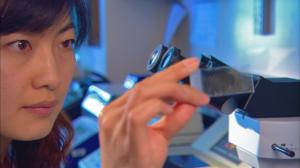UH researchers to address military risk factors associated with cancer with $3 million in grants
University of Hawaiʻi at MānoaUniversity of Hawai‘i Cancer Center and John A. Burns School of Medicine researchers were awarded three out of only 45 United States Department of Defense (DoD) grants for cancer research and career development.
Said Congressman Mark Takai, "The UH Cancer Center is the only NCI-designated center in Hawai‘i or the Pacific, and access to these critical funds will help them continue the groundbreaking work the center does every day. As someone battling cancer myself, I have a strong appreciation for the dedicated researchers that are working toward a cure. With the increased funding provided to NIH last year by Congress, more of these grants will become available, and I look forward to working with UH to make sure they see their fair share."
The awards to UH are for malignant mesothelioma (MM) research and total more than $3 million. Mesothelioma is an asbestos-related cancer of the lining that covers the lungs and abdomen.
“I congratulate the University of Hawai‘i Cancer Center and the John A. Burns School of Medicine for receiving these much-needed grants,” said U.S. Senator Brian Schatz. “This funding will help researchers advance our knowledge of cancers and help develop careers in the study of medicine.”
UH Cancer Center Associate Professor Haining Yang and Michele Carbone, director of thoracic oncology, received as joint principal investigators a 3-year, $1.9-million Translational Team Science Award for their study, “HMGB1 and Its Isoforms as Biomarkers for Mineral Fiber Exposure and Mesothelioma Detection.”
The researchers will work on discovering biomarkers to predict the risk of developing mesothelioma. A reviewer of the study noted, “It could have impact on military personnel who have had asbestos exposure and hopefully lead to early detection of mesothelioma.”
Drs. Carbone and Yang are also the principal investigators for a 2-year, $600,000 Idea Award with Special Focus for the study, “Identification and Validation of Novel Germline DNA Variants Associated to Increased Risk of Malignant Mesothelioma.”
The aim of the study is to identify novel genes that, when mutated, increase the risk of developing mesothelioma, especially among asbestos-exposed individuals. This potential discovery would lead to screening of susceptible individuals for prevention and early detection and to specific drug designs.
Pietro Bertino, assistant researcher at the John A. Burns School of Medicine, received a 3-year, $550,000 Career Development Award for his study, “Preclinical Development of TVAX: An Advanced Multiantigen Vaccine for Therapy and Prevention of Malignant Mesothelioma.” The overall objective for the study is to develop a vaccine against Malignant Mesothelioma.
Dr. Bertino’s career goal is to become a translational research scientist focused on the development of treatment and prevention therapies for mesothelioma. The sponsoring mentors who will help him achieve his goals are Dr. Peter R. Hoffmann, an associate professor at the John A. Burns School of Medicine, and Dr. Carbone.
“The remarkable success of our Cancer Center and JABSOM researchers in obtaining these awards illustrates the role of the University of Hawai’i as leaders in mesothelioma research,” said David Lassner, president of the University of Hawai’i. “This demonstrates our ability to reduce the burden of cancer locally, nationally and internationally.”
According to the Department of Veterans Affairs, several million individuals who have served in the military were exposed to asbestos during their service. More than 30% of mesothelioma patients were exposed to asbestos in some form of military service, primarily in the Navy, as noted in the review summaries.
The University of Hawai‘i Cancer Center (UH Cancer Center) and The John A. Burns School of Medicine (JABSOM) significantly affect the medical community, the lives of students and residents, and the O‘ahu economy as a whole. Together, JABSOM and the UH Cancer Center added $510.6 million to the O‘ahu economy in 2015, equivalent to creating 5,972 new jobs. The UH Cancer Center is one of 69 National Cancer Institute (NCI) designated cancer centers, and JABSOM is one of the leading medical education institutions in the United States.

